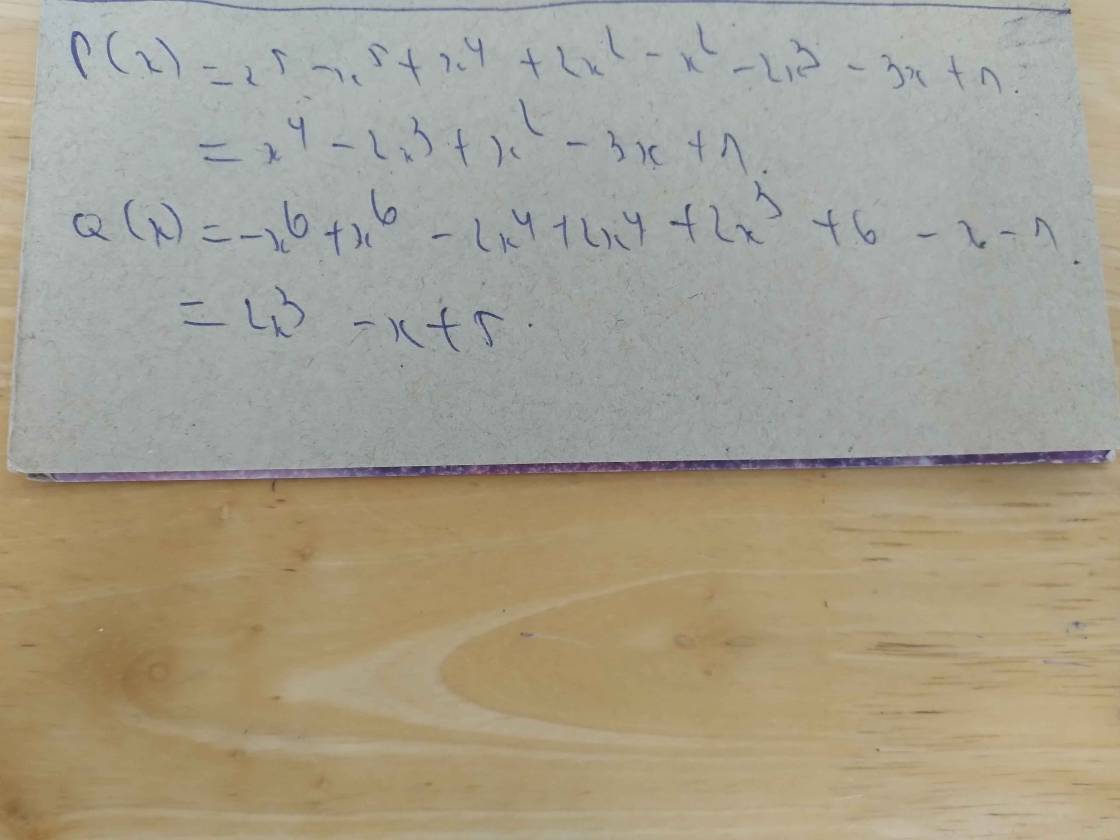Hãy nhập câu hỏi của bạn vào đây, nếu là tài khoản VIP, bạn sẽ được ưu tiên trả lời.

`P(x)=x ^ 5 + 2x ^ 2 - x ^ 2 - 2x ^ 3 - x ^ 5 + x ^ 4 - 3x + 1`
`P(x)= (x^5-x^5)+x^4-2x^3+(2x^2-x^2)-3x+1`
`P(x)=x^4+2x^3+x^2-3x+1`
`Q(x)=`\(-x^6+2x^3+6-2x^4+x^6-x-1+2x^4\)
`Q(x)= (-x^6+x^6)+(-2x^4+2x^4)+2x^3-x+(6-1)`
`Q(x)=2x^3-x+5`

a) \(3x^5-2x^2+x^4-\dfrac{1}{2}x-x^5+x^2-3x^4-1\)
\(=2x^5-x^2-2x^4-\dfrac{1}{2}x-1\)
\(=1-\dfrac{1}{2}x-x^2-2x^4+2x^5\)
Đa thức bậc 5, hệ số cao nhất là 2, hệ số tự do là -1.
b) \(2x^4-2x^2+4x^5+3x^2-x+x^2+1-x^4-2x^5\)
\(=x^4+2x^2+2x^5-x+1\)
\(=1-x+2x^2+x^4+2x^5\)
Đa thức bậc 5, hệ số cao nhất là 2, hệ số tự do là 1.

a: \(P\left(x\right)=-5x^4+2x^2-8x+\dfrac{1}{2}\)
\(Q\left(x\right)=4x^4+2x^3-5x^2-6x+\dfrac{3}{2}\)
b: \(A\left(x\right)=-5x^4+2x^2-8x+\dfrac{1}{2}+4x^4+2x^3-5x^2-6x+\dfrac{3}{2}=-x^4+2x^3-3x^2-14x+2\)
\(B\left(x\right)=-5x^4+2x^2-8x+\dfrac{1}{2}-4x^4-2x^3+5x^2+6x-\dfrac{3}{2}=-9x^4-2x^3+7x^2-2x-1\)

Bài 1:
a) Ta có: \(P\left(x\right)=3x^4+2x^2-3x^4-2x^2+2x-5\)
\(=\left(3x^4-3x^4\right)+\left(2x^2-2x^2\right)+2x-5\)
\(=2x-5\)
Bài 1:
b)
\(P\left(-1\right)=2\cdot\left(-1\right)-5=-2-5=-7\)
\(P\left(3\right)=2\cdot3-5=6-5=1\)

\(a,Q\left(x\right)=-3x^4+4x^3+2x^2+\dfrac{2}{3}-3x-2x^4-4x^3+8x^4+1+3x\\ =\left(-3x^4-2x^4+8x^4\right)+\left(4x^3-4x^3\right)+2x^2+\left(3x-3x\right)+1\\ =3x^4+2x^2+1\\ b,Q\left(x\right)=0\\ \Leftrightarrow3x^4+2x^2+1=0\\ \Delta=b^2-4ac=2^2-4.3.1=-8< 0\)
Vậy Q(x) không có nghiệm

a)\(P\left(x\right)=x^4+3\)
b)\(Q\left(x\right)=-x^3-2x^2-14x-1\)